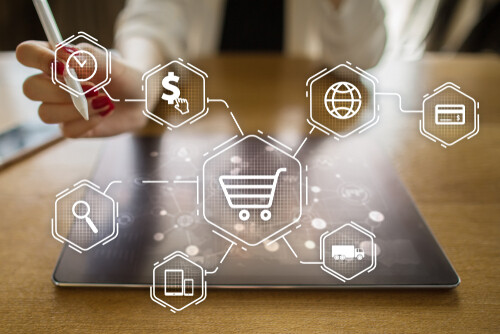Last year, Jasmine Ronald, an author with Towards Data Science, wrote an article showing that big data is changing the direction of the ecommerce market in unexpected ways. This view is shared by experts at Big Commerce and other big data publishers.
A growing number of software publishers are using big data to improve the value of their algorithms. This is going to have a huge impact on the future of the profession.
How Big Data is Changing the Future of eCommerce Software
The coronavirus epidemic has created havoc in almost every profession. This contagious virus has led to the closure of factories, retail stores, airlines, hotels, and more or less, the entire tourism industry. The public is being asked to isolate themselves to prevent the acquisition or transmitting this virus to others socially.
Big data is helping in the fight against the COVID-19 crisis. Most experts have focused on the benefits of using big data to understand trends with the virus. However, it is also helping people meet their needs without exposure. This should help us see the benefits of new data solutions after the crisis ends.
In the business world, it is the retailers who have been hit the hardest. Because of the coronavirus epidemic, the way retail business is being conducted will need to change, at least for the next few months, maybe longer.
However, some companies seem to be flourishing, as big data and technology advances are helping them fill the void. The ecommerce sector is a prime example.
At this point in time, it is critical to survive, serve customers, and still manage key functions remotely. Fortunately, technology has now made it possible for retail businesses to adapt to the circumstances and continue to remain viable.
Today, there are many software options that can benefit retailers. Best of all, they may even help retailers make quick, sweeping changes to business practices to better accommodate the current climate and maintain some sense of financial stability.
These software programs can not only increase efficiency but can also enable retailers to sustain positive customer relationships during this crisis. While there is a great deal of options, knowing which one will suit your business best can be tough.
There is no single software that can be applied to all businesses, and thus you need to evaluate each option per your needs. You may need an excellent project management platform to coordinate your teams, or an efficient monitoring software for employees to boost productivity and improve time management. Big data has helped them retain a powerful competitive edge in a changing world. One software cannot take care of all your retail problems, so it is important to identify which ones you need and why you need it and how it aligns with your business goals.
Here is a list of some essential software that could benefit retailers by employing major advances in big data technology right now:
Zipline
Zipline offers retail communication software. Why is it necessary? Store execution usually breaks down because communication breaks down.
Zipline uses incredibly sophisticated big data algorithms to accomplish these goals. It uses machine learning to understand traditional communication issues and resolve them.
Most brands sill manage their fleet of stores through outdated technology, endless email strings and countless documents. When you have hundreds, if not thousands of stores, it’s hard to make quick changes without chaos. Now throw in a worldwide pandemic and you can understand how vital communication really is.
When you can streamline communcations and get everyone from CEOs, store managers and employees on board instantly you can align the same goals with different teams and stores across the country, boost store execustion and most importantly, develop a seamless customer journey.
Zipline does just that by allowing retailers to bring their brand to life. The software is cloud-based, mobile and desktop friendly and supports many countries and several languages.
Cin7
Tracking your inventory both online and in the physical store, is a very important task for most retailers. This tools also relies on machine learning. It can use big data algorithms to forecast inventory needs for every retailer.
Generally, retailers work with several suppliers and vendors to keep the business running. If you have a large inventory and many suppliers, then it is essential to have software that will keep track of the supply chain, especially now when it seems vital supplies are bottlenecked and in short supply everywhere.
Cin7 is one such software that connects your online sales, warehouses, electronic data, third party logistics, and allows you to create a comprehensive inventory tracking system all on your computer.
Asana
Asana is an excellent task management tool that allows businesses to communicate with team members remotely. It enables you to set up different tasks, put up deadlines, assignees, collaborators, and post comments and follow-up. Now is not the time to let important to-do lists and tasks fall behind. So, if your store has been behind the curve on this before, consider investing in task management to get ahead.
Asana has been around for many years and has proven to improve task management across different departments, functions, and teams.
Hubstaff
With so many retailers now switching to eCommerce platforms and focusing on maximizing online sales, more and more sales associates and customer service representatives now also work remotely.
When we add the mandated closing of businesses around the country (and even in other parts of the world) managing remote employees will be more important than ever.
How can one keep track of their hours and their productivity and ensure proper payroll management? Hubstaff allows you to do just that. It monitors every employee’s activity, tracks their performance, generates activity reports, and allows you to submit timesheets, creative invoices and make payments.
Quickbooks
Every business needs an accounting software, and the most popular one is QuickBooks. Quickbooks will allow you to organize your finances, track expenses, receive payments, create invoices, and overall improve your money management activities, something you don’t want to let fall behind right now.
Now it’s Your Turn
Choosing the right software, the first time around will help avoid errors and headaches in your business right now and for many years to come.
Some other features you may wish to consider including in a new software program:
- Mobile friendly: Since most people today use the mobile phone for almost everything, it would be best if the software program is mobile friendly and can handle all types of queries, payment plans, digital receipts, and provide the consumer with a smooth shopping experience.
- Software requirements: You should always know what you will need to have to be able to install the software in terms of the operating system, space, speed, etc.
- Software Usability: How many people can use it at any point in time? Is the software easy to use? Can it be accessed from a variety of locations? Will it interfere with the software you already have? Will it fit within your budget?
- Reviews: Read reviews and talk to vendors. What do others have to say about the software? Talk to other retailers and get feedback. Review the demos to understand how it works.
- Talk to your team: Software use in a retail business requires a team approach, including an IT professional. The last thing you want is your online website to shut down because of some minor technical problem. Get input from others in your business and determine what they have to say.
With the economy going downhill fast, retail businesses must take proactive steps to ensure that they can survive the present crisis. Implementation of the right software can help online businesses sustain their business and maintain good customer relationships.
Big Data is Changing the Face of ECommerce
We have seen how ecommerce needs have changed in the face of the COVID-19 pandemic. The good news is that big data algorithms are making ecommerce more reliable than ever. Smart retailers will leverage these data algorithms to get more value for their customers.








